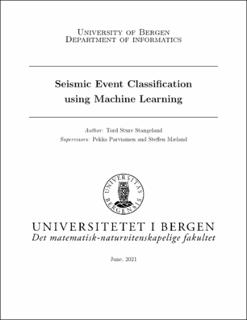Seismic Event Classification using Machine Learning
Master thesis
Permanent lenke
https://hdl.handle.net/11250/2761757Utgivelsesdato
2021-06-02Metadata
Vis full innførselSamlinger
- Master theses [197]
Sammendrag
The manual detection of seismic events is a labor intensive task, requiring highly skilled workers continuously analyzing recorded waveforms. Previous work has shown the potential of machine learning methods for aiding in this task, and that deep neural networks are able to learn important patterns in seismic recordings. This study aims to develop a deep neural network to classify earthquake-, explosion and noise events using long beamformed waveform snippets from NORSAR's ARCES array. The final model was evaluated using an unseen test set and on recordings of the North Korean nuclear weapons tests. I developed custom augmentation methods in order to combat the uneven class distribution, and several preprocessing techniques were deployed in pursuit of performance. Models developed for similar data, state-of-the-art multivariate time series models, as well as self-developed models were experimented with and evaluated. Analysis of the results demonstrated that the final model can classify noise and explosion events with a high degree of accuracy, while earthquake classifications were less reliable. I conclude that deep neural networks can learn distinguishing features and detect events of interest on long beamformed three-component waveforms.
